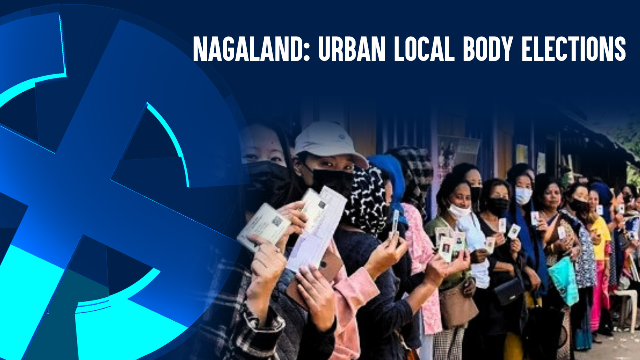Context:
Nagaland, a state nestled in the northeastern part of India, has recently been the center of attention due to the long overdue urban local body (ULB) elections. These polls, which have been stalled for two decades, have stirred debates and controversies, particularly concerning the reservation of 33% of the wards for women. The complexity of this issue intertwines with constitutional provisions, traditional tribal governance structures, and the quest for gender representation in decision-making bodies. Understanding the intricacies of Nagaland's political landscape is crucial to grasp the significance of these elections and the challenges they face.
The History of Delayed Polls
The saga of Nagaland's stalled ULB elections dates back to 2004 when the first and only civic body election was conducted without any reservation for women. Subsequent attempts to implement the mandated 33% reservation met fierce opposition, leading to indefinite postponements and legislative maneuvers. The crux of the issue lies in the conflict between constitutional directives and traditional tribal norms, exacerbated by the protective provisions granted to Nagaland under Article 371A. This legal and cultural clash resulted in a protracted stalemate, keeping Nagaland as the only state in India without women's reservation in local governance bodies.
|
About Article 371A Article 371A of the Indian Constitution, inserted through the 13th Amendment Act of 1962, grants special constitutional provisions to the State of Nagaland. This article stipulates that Acts of Parliament related to religious or social practices, Naga customary law, administration of civil and criminal justice based on Naga customary law, and ownership and transfer of land and its resources shall not apply to Nagaland unless the Legislative Assembly of Nagaland passes a resolution to that effect. |
Controversy Over Women's Reservation
The reservation of seats for women in ULBs became a contentious issue due to deeply ingrained cultural norms and perceptions regarding women's roles in decision-making processes. Traditional tribal bodies, such as the Naga hohos, opposed the reservation, arguing that it would interfere with the autonomy granted to Nagaland under Article 371A. The reluctance to embrace women's representation stemmed from historical practices where Naga women were excluded from formal governance structures. This clash between tradition and constitutional mandates underscored the broader struggle for gender equality and social transformation in Nagaland.
Legislative Maneuvers and Reforms
Over the years, Nagaland witnessed a series of legislative maneuvers and reforms aimed at addressing the impasse over ULB elections. Amendments to the Municipal Act, attempts to exempt Nagaland from constitutional provisions, and subsequent revisions reflected the government's efforts to navigate the complex terrain of tribal sensitivities and legal obligations. The passage of the amended Municipal Bill in 2023, retaining the 33% reservation while addressing other contentious issues like the reservation for chairperson's post and taxation on immovable properties, marked a significant milestone in the journey towards holding long-delayed civic polls.
Challenges and Reservations
Despite legislative reforms and consultations with stakeholders, challenges persist on the road to conducting ULB elections in Nagaland. While many tribal bodies have come to accept the provisions of the amended Municipal Act, pockets of resistance remain, exemplified by the Eastern Nagaland People's Organisation's decision to boycott the polls. The ENPO's stance, driven by broader demands for territorial autonomy, reflects the complex interplay between local aspirations, national politics, and tribal identities. Negotiating these challenges requires a delicate balance between respecting traditional governance structures and upholding constitutional principles of democracy and gender equality.
The Path Forward
As Nagaland prepares for the upcoming ULB elections scheduled for June 26, 2024, it stands at a critical juncture in its democratic journey. The resolution of long-standing issues surrounding women's reservation in local governance bodies symbolizes a step towards inclusivity and progressive change. However, challenges remain, particularly in reconciling divergent interests and ensuring meaningful participation from all sections of society. The success of these elections hinges not only on logistical preparations but also on fostering dialogue, understanding, and consensus-building among stakeholders. Ultimately, the conduct of free, fair, and peaceful elections will not only shape Nagaland's political landscape but also reaffirm its commitment to democratic ideals and pluralism.
|
Probable Questions for UPSC Mains Exam Question: Discuss the significance of the reservation of 33% of wards for women in Nagaland's Urban Local Body (ULB) elections, highlighting the constitutional, cultural, and social factors influencing the debate. How has the clash between traditional tribal norms and constitutional mandates shaped the discourse on gender representation in decision-making bodies? (10 marks, 150 words) Question: Analyze the legislative and political maneuvers undertaken to address the prolonged delay in holding Urban Local Body (ULB) elections in Nagaland. How have amendments to the Municipal Act, attempts to reconcile tribal sensitivities with constitutional obligations, and consultations with stakeholders contributed to shaping the path forward for democratic governance in the state?(15 marks, 250 words) |







